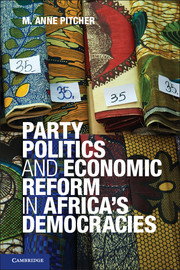Book contents
- Frontmatter
- Contents
- Tables, Figures, and Maps
- Acknowledgments
- Abbreviations
- Map
- 1 Understanding Institutional Development in Africa
- 2 From Motivational to Imperative Commitment
- 3 The Impact of Party Politics and Democratic Quality on Economic Reform
- 4 Party Fragmentation and Ad Hoc Private Sector Development in a Limited Democracy
- 5 Stable Parties, Limited Democracy, and Partisan Private Sector Development
- 6 Stable Parties, Liberal Democracy, and Strategic Compromise
- 7 Conclusion
- Appendix 1 Coding Scheme
- Appendix 2 Coding Scheme Indicators of Imperative Commitments
- Appendix 3 Effective Number of Parliamentary Parties (ENPP) in Nine African Democracies c. 1990s–2000s
- Bibliography
- Index
- References
3 - The Impact of Party Politics and Democratic Quality on Economic Reform
Published online by Cambridge University Press: 05 June 2012
- Frontmatter
- Contents
- Tables, Figures, and Maps
- Acknowledgments
- Abbreviations
- Map
- 1 Understanding Institutional Development in Africa
- 2 From Motivational to Imperative Commitment
- 3 The Impact of Party Politics and Democratic Quality on Economic Reform
- 4 Party Fragmentation and Ad Hoc Private Sector Development in a Limited Democracy
- 5 Stable Parties, Limited Democracy, and Partisan Private Sector Development
- 6 Stable Parties, Liberal Democracy, and Strategic Compromise
- 7 Conclusion
- Appendix 1 Coding Scheme
- Appendix 2 Coding Scheme Indicators of Imperative Commitments
- Appendix 3 Effective Number of Parliamentary Parties (ENPP) in Nine African Democracies c. 1990s–2000s
- Bibliography
- Index
- References
Summary
The previous chapter established theoretically that commitments to private sector development have imperative credibility when constraints exist on the state’s ability arbitrarily to renege on market reforms. Empirically, it documented a considerable range in the extent to which most African governments approximated ideal type, imperatively credible commitments. With respect to cases such as Botswana, Mauritius, and South Africa, which already had private sectors that had been operational for some time, institutions largely acted to constrain the state’s discretionary behavior. On the other end of the spectrum, cases such as Zimbabwe or Guinea illustrated that governments continued to intervene arbitrarily in strategic sectors or to encourage corrupt practices by customs officials. Although they did not approximate the ideal type, countries such as Mozambique, Cape Verde, Ghana, or Mali, with histories of significant state intervention, sold state assets, liberalized trade, and built formal relationships with an emerging private sector. Finally, the scores of countries such as Madagascar, Niger, and Cameroon indicated that state discretion competed with institutional constraints across a range of economic arenas.
This chapter explains these divergent trajectories of institutional development by investigating the ways in which the political dynamics of particular countries propel or constrain the privatization process. Not only do existing political coalitions mold institutions over time, but state responses to their actions also produce unanticipated outcomes. Moreover, reforms generate new constituencies that have a vested interest in maintaining new institutional arrangements. For example, growing numbers of foreign and domestic investors brought their preferences to bear on states in Malawi or Ghana. Investors helped to make commitments more credible because, in selected instances, the pursuit of their interests acted to curtail state discretion. Alternatively, institutional changes may catalyze interests that seek to undermine existing arrangements in order to maintain a status quo more coincident with their preferences. Zimbabwe and Nigeria have demonstrated such patterns.
- Type
- Chapter
- Information
- Party Politics and Economic Reform in Africa's Democracies , pp. 65 - 104Publisher: Cambridge University PressPrint publication year: 2012



